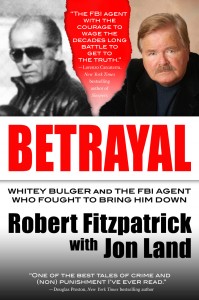John McIntyre
Betrayal is coming
on September 6th, 2011 in Blog Posts, Normal by cosproductions | 15 CommentsSo begins BETRAYAL (Forge, January 3, 2012), my first nonfiction book after thirty novels. The speaker is the Boston gangster Whitey Bulger, addressing his soon-to-be victim John McIntyre, an informant capable of bringing him down once and for all, in 1984.
The hero of BETRAYAL is Robert Fitzpatrick, one of the most celebrated FBI agents of his time who was sent to Boston in late 1980 to “kick ass and take names.” Simply stated, the office had spiraled out of control in large part because of the degree to which agents and officials stretching all the way to Washington were beholden to Whitey Bulger. Bulger, you see, was an informant the Bureau was relying on to give them what they wanted most : the Italian mob. Of course, since he was the titular head of the rival Irish Winter Hill gang and promised to prosper from the takedown of the mafia, he was all too happy to cooperate.
Only he didn’t. In all his years as an informant, Whitey Bulger gave the FBI nothing that helped them take down the mafia. Nothing. That’s what Bob Fitzpatrick uncovered when he got to Boston and what was pretty much confirmed during his first and only meeting with Bulger himself. Check out the following excerpt, one of my favorite scenes in the book:
“I never got your name.”
“That’s ‘cause you didn’t shake my hand. It’s Fitzpatrick.”
“You don’t understand,” he boasted. “I was in Alcatraz; I was in the toughest penitentiaries. I’m a bad guy, not somebody you wanna come out here and mess with.”
“Is that what I’m doing, Whitey, messing with you?”
“You tell me.”
“I just asked you.”
“You got any idea of the stuff I’ve done?”
“That’s why I’m here, to find out what you’ve done and what you’re doing for us. See, you wanna tell me about all the stuff you’ve done when I want to hear what you’re doing for me. Because you’re the informant.” My last remark, a caustic taunt. “Whitey, what are you doing for the FBI?” I finally asked when he lapsed into silence, even though the answer was already written on the parts of his face I could see through the dim lighting. “What are you doing for me?”
The answer, of course, was nothing, and Fitzpatrick embarked on a twenty-year quest, both in and out of the FBI, to prove that to the world in general and Bureau in particular. Three times he developed informants prepared to give up Bulger and force the FBI to give the gangster up as an alleged informant. All three times information leaked out from within the Bureau, and all three times the informants were murdered, the last one being John McIntyre whose body was not recovered until 2000.
What attracted me to Fitzpatrick’s story, which became BETRAYAL, was that it was one of those rare nonfiction “thrillers” that had a third act. Even before Whitey Bulger was finally captured in Santa Monica in California last June, a series of trials over the past few years had already validated all of Fitzpatrick’s claims and fully vindicated his efforts. Bulger’s apprehension was just the icing on the cake.
And here’s the thing. My fictional thrillers also feature heroes defined by their ability to overcome incredible odds and survive, if not thrive, on their own. They are men and women unafraid to buck the system, to do the right thing regardless of what they must sacrifice along the way. Well, that describes Bob Fitzpatrick perfectly.
“I took on plenty of guys like you,” Bulger taunted during that now famous meeting with Fitzpatrick. “Turned out they weren’t so tough either.”
Turned out he couldn’t have been more wrong.

